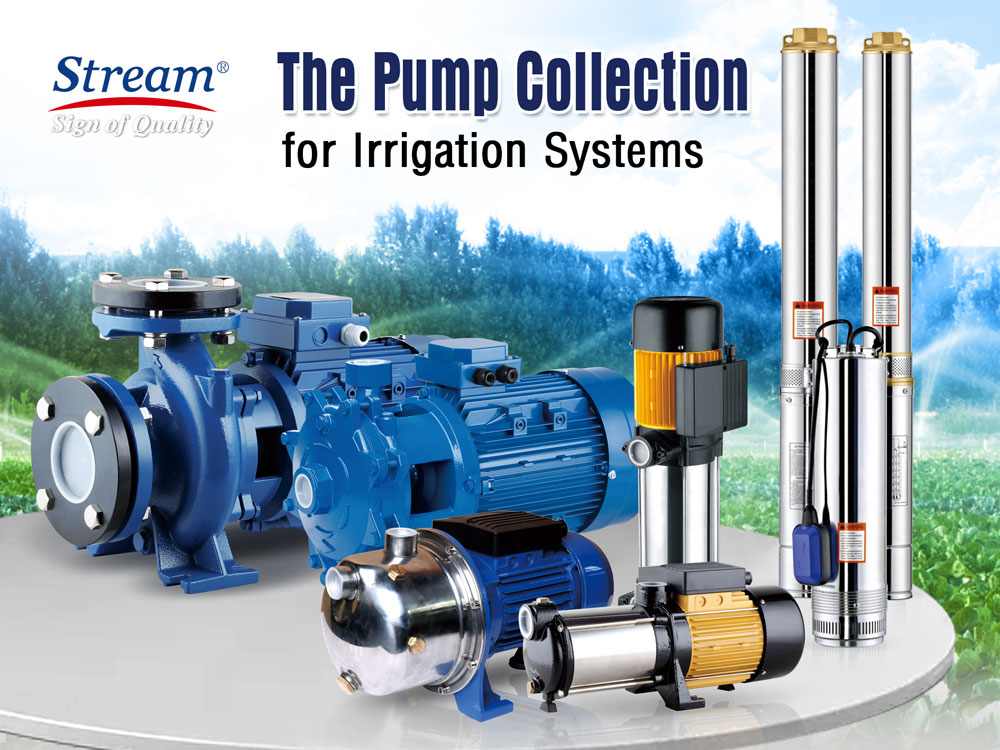+86 13816508465
Pump Solutions
Aug. 14, 2024
Irrigation pumps are an essential tool for modern agriculture, providing a reliable source of water for crops and plants. There are several different types of irrigation pumps available on the market, each with its own unique features and benefits. In this article, we will explore the different types of irrigation pumps and their characteristics, helping you choose the best pump for your irrigation needs.

Basically, there are two kinds of pumps used for irrigation purposes, the submersible pumps and the centrifugal pumps.
Submersible Pumps
They are placed fully under the water, pushing the water out of a pipe and directed into the irrigation systems.
Advantages:
Efficiency: Submersible pumps are highly efficient, with minimal energy loss due to the absence of suction and discharge piping.
Easy Installation: Submersible pumps are easy to install, with no need for suction and discharge piping.
Compact Size: Submersible pumps are small and compact, making them easy to transport and store.
Versatility: Submersible pumps can be used in a variety of irrigation applications, including drip irrigation, sprinkler systems, and pivot irrigation.
Disadvantages:
Limited Depth: Submersible pumps are limited in terms of the depth at which they can operate, as they must be fully submerged in water.
High Cost: Submersible pumps tend to be more expensive than other types of irrigation pumps.
Difficult Maintenance: Submersible pumps can be difficult to maintain, as they must be removed from the water in order to be serviced.
Variants:
Floated Submersible Pumps
These submersible pumps are commonly seen in every house which can be used to extract water from water tanks, pools, ponds and streams to water the garden plants.
They can only used for simple irrigation purpose where you don’t need large amount of flow and pressure.
Deep Well Submersible Pumps
These pumps are used to extract water from deep underground sources, such as wells or aquifers. They are typically used in areas where the water source is deep or where there is a shortage of surface water, and need long distance or high pressure of irrigation needs.
Centrifugal(Surface) Pumps
These pumps are located on dry land and water enters the pump through a pipe and is pumped from there out to the irrigation system.
Advantages:
High Efficiency: Centrifugal pumps are highly efficient, with minimal energy losses due to their simple design.
Versatility: there are many types of centrifugal pumps that can be used in a variety of irrigation applications, including drip irrigation, sprinkler systems and pivot irrigation.
Easy Maintenance: Centrifugal pumps are easy to maintain, with simple and straightforward designs.
Cost Effective: Centrifugal pumps are a cost-effective choice for irrigation, with a relatively low upfront cost.
Disadvantages:
Limited Head: Centrifugal pumps are limited in terms of the head (pressure) they can generate, which may limit their use in some irrigation applications.
Suction and discharge piping required: Centrifugal pumps require suction and discharge piping, which can increase the overall cost and complexity of the irrigation system.
Limited submerged operation: Centrifugal pumps are not designed for submerged operation and cannot be used in water sources that are too deep.
Variants:
JET Pumps
The JET pumps are fitted with a jet and a venturi pipe to allow the pump to lift water from lower depths, mostly 8-9m deep from the surface.
Multistage Pumps
The multistage pumps are also called high head pumps which can develop high pressure from the water source to the water outflow.
End Suction Pumps
The end suction pumps are mostly used for agriculture irrigation with high flow capacity.
They are featured with wide flow range, compact size and easy installation.
Other Factors to Consider:
When knowing the type of irrigation pumps, there are also some key factors to consider before you choose the right one for your system:

Water Source:
What and where is your water source for the irrigation system? You will need to determine the location and depth of the water source, as well as the volume and pressure of the water. This will help you choose a pump that is suitable for your specific water source, i.e.:
For wells, the most commonly used pump is a submersible pump.
But a jet pump is also used in a shallow well no deeper than 8m.
For ponds, lakes or streams, the submersible pump and jet pump are both ok depends on whether you need a vertical
For municipal water systems, a booster pump is helpful to boost the water pressure.
Irrigation System:
The size and type of your irrigation system will also play a role in choosing the right pump. You will need to consider the size of the field, the type of crops you are growing, and the water requirements of those crops. This will help you choose a pump that is capable of delivering the right amount of water to your irrigation system.
Maintenance and Repair:
It is important to consider the maintenance and repair requirements of the pump you choose. Some pumps are easier to maintain and repair than others, and this can be a factor in your decision.
Cost:
It is important to choose a pump that is within your budget and that will provide a good return on investment over time.
Overall, get brief ideas of the types of irrigation pumps and the key factors to consider, you will be able to fix a pump range that is suitable for your specific irrigation system and water source.
Previous: Swimming Pool Pumping Solutions
Next: Irrigation Pump Solution
Address
No.17 XeDa Jimei Ind. Park, Xiqing Economic Development Area, Tianjin, China
Telephone
+86 13816508465
QUICK LINKS